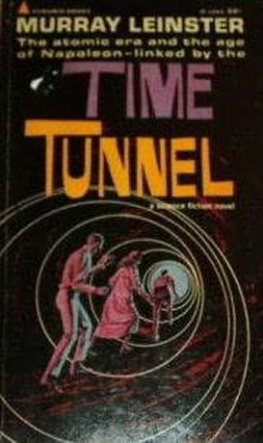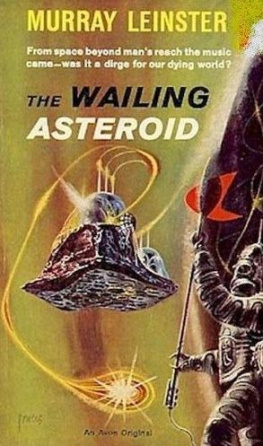Murray Leinster - The Ethical Equations
Here you can read online Murray Leinster - The Ethical Equations full text of the book (entire story) in english for free. Download pdf and epub, get meaning, cover and reviews about this ebook. genre: Science fiction. Description of the work, (preface) as well as reviews are available. Best literature library LitArk.com created for fans of good reading and offers a wide selection of genres:
Romance novel
Science fiction
Adventure
Detective
Science
History
Home and family
Prose
Art
Politics
Computer
Non-fiction
Religion
Business
Children
Humor
Choose a favorite category and find really read worthwhile books. Enjoy immersion in the world of imagination, feel the emotions of the characters or learn something new for yourself, make an fascinating discovery.

- Book:The Ethical Equations
- Author:
- Genre:
- Rating:5 / 5
- Favourites:Add to favourites
- Your mark:
- 100
- 1
- 2
- 3
- 4
- 5
The Ethical Equations: summary, description and annotation
We offer to read an annotation, description, summary or preface (depends on what the author of the book "The Ethical Equations" wrote himself). If you haven't found the necessary information about the book — write in the comments, we will try to find it.
The Ethical Equations — read online for free the complete book (whole text) full work
Below is the text of the book, divided by pages. System saving the place of the last page read, allows you to conveniently read the book "The Ethical Equations" online for free, without having to search again every time where you left off. Put a bookmark, and you can go to the page where you finished reading at any time.
Font size:
Interval:
Bookmark:
BY MURRAY LEINSTER
IT IS VERY, very queer. The Ethical Equations, of course, link conduct with probability, and give mathematical proof that certain patterns of conduct increase the probability of certain kinds of coincidences. But nobody ever expected them to have any really practical effect. Elucidation of the laws of chance did not stop gambling, though it did make life insurance practical. The Ethical Equations werent expected to be even as useful as that. They were just theories, which seemed unlikely to affect anybody particularly. They were complicated, for one thing. They admitted that the ideal pattern of conduct for one man wasnt the best for another. A politician, for example, has an entirely different codeand properlythan a Space Patrol man. But still, on at least one occasion
The thing from outer space was fifteen hundred feet long, and upward of a hundred and fifty feet through at its middle section, and well over two hundred in a curious bulge like a fishs head at its bow. There were odd, gill-like flaps just back of that bulge, too, and the whole thing looked extraordinarily like a monster, eyeless fish, floating in empty space out beyond Jupiter. But it had drifted in from somewhere beyond the suns gravitational fieldits speed was too great for it to have a closed orbitand it swung with a slow, inane, purposeless motion about some axis it had established within itself.
The little spacecruiser edged closer and closer. Freddy Holmes had been a pariah on the Arnina all the way out from Mars, but he clenched his hands and forgot, his misery and the ruin of his career in the excitement of looking at the thing.
No response to signals on any frequency, sir, said the communications officer, formally. It is not radiating. It has a minute magnetic field. Its surface temperature is just about four degrees absolute.
The commander of the Arnina said, Hrrrmph! Then he said, Well lay alongside. Then he looked at Freddy Holmes and stiffened. No, he said, I believe you take over now, Mr. Holmes.
Freddy started. He was in a very bad spot, but his excitement had made him oblivious of it for a moment. The undisguised hostility with which he was regarded by the skipper and the others on the bridge.brought it back, however.
You take over, Mr. Holmes, repeated the skipper bitterly. I have orders to that effect. You originally detected this object and your uncle asked Headquarters that you be given full authority to investigate it. You have that authority. Now, what are you going to do with it?
There was fury in his voice surpassing even the rasping dislike of the voyage out. He was a lieutenant commander and he had been instructed to take orders from a junior officer. That was bad enough. But this was humanitys first contact with an extrasolar civilization, and Freddy Holmes, lieutenant junior grade, bad been given charge of the matter by pure political pull.
Freddy swallowed.
I . . . I He swallowed again and said miserably, Sir, Ive tried to explain that I dislike the present set-up as much as you possibly can. I . . wish that you would let me put myself under your orders, sir, instead of
No! rasped the commander vengefully. You are in command, Mr. Holmes. Your uncle put on political pressure to arrange it. My orders are to carry out your instructions, not to wet-nurse you if the job is too big for you to handle. This is in your lap! Will you issue orders?
Freddy stiffened.
Very well, sir. its plainly a ship and apparently a derelict. No crew would come in without using a drive, or allow their ship to swing about aimlessly. You will maintain your present position with relation to it. Ill take a spaceboat and a volunteer, if you will find me one, and look it over.
He turned and left the bridge. Two minutes later he was struggling into a spacesuit when Lieutenant Bridgesalso junior gradecame briskly into the spacesuit locker and observed:
Ive permission to go with you, Mr. Holmes. He began to get into another spacesuit. As he pulled it up over his chest he added blithely: Id say this was worth the price of admission!
Freddy did not answer. Three minutes later the little spaceboat pulled out from the side of the cruiser. Designed for expeditionary work and tool-carrying rather than as an escapecraft, it was not enclosed. It would carry men in spacesuits, with their tools and weapons, and they could breathe from its tanks instead of from their suits, and use its power and so conserve their own. But it was a strange feeling to sit within its spidery outline and see the great blank sides of the strange object draw near. When the spaceboat actually touched the vast metal wall it seemed impossible, like the approach to some sorcerers castle across a monstrous moat of stars.
It was real enough, though. The felted rollers touched, and Bridges grunted in satisfaction.
Magnetic. We can anchor to it. Now what?
We hunt for an entrance port, said Freddy curtly. He added: Those openings that look like gills are the drive tubes. Their drives in front instead of the rear. Apparently they dont use gyros for steering.
The tiny craft clung to the giants skin, like a fly on a stranded whale. It moved slowly to the top of the rounded body, and over it, and down on the other side. Presently the cruiser came in sight again as it came up the near side once more.
Nary a port, sir, said Bridges blithely. Do we cut our way in?
Hm-m-m, said Freddy slowly. We have our drive in the rear, and our control room in front. So we take on supplies amidships, and thats where we looked. But this ship is driven from the front. Its control room might be amidships. If so, it might load at the stem. Lets see.
The little ctaft crawled to the stern of the monster.
There! said Freddy.
It was not like an entrance port on any vessel in the solar system. It slid aside, without hinges. There was an inner door, but it opened just as readily. There was no rush of air, and it was hard to tell if it was intended as an air lock or not.
Airs gone, said Freddy. Its a derelict, all right. You might bring a blaster, but what well mostly need is light, I think.
The magnetic anchors took hold. The metal grip shoes of the spacesuits made loud noises inside the suits as the two of them pushed their way into the interior of the ship. The spacecruiser had been able to watch them, until now. Now they were gone.
The giant, enigmatic object which was so much like a blind fish in empty space floated on. It swung aimlessly about some inner axis. The thin sunlight out here beyond Jupiter, smote upon it harshly. It seemed to hang motionless in mid-space against an all-surrounding background of distant and unwinking stars. The trim Space Patrol ship hung alertly a mile and a half away. Nothing seemed to happen at all.
Freddy was rather pale when he went back to the bridge. The pressure mark on his forehead from the spacesuit helmet was still visible, and he rubbed at it abstractedly. The skipper regarded him with a sort of envious bitterness. After all, any human would envy any other who had set foot in an alien spaceship. Lieutenant Bridges followed him. For an instant there were no words. Then Bridges saluted briskly:
Reporting back on board, sir, and returning to watch duty after permitted volunteer activity.
The skipper touched his hat sourly. Bridges departed with crisp precision. The skipper regarded Freddy with the helpless fury of a senior officer who has been ordered to prove a junior officer a fool, and who has seen the assighment blow up in his face and that of the superior officers who ordered it. It was an enraging situation. Freddy Holmes, newly commissioned and assigned to the detector station on Luna which keeps track of asteroids and meteor streams, had discovered a small object coming in over Neptune. Its speed was too high for it to be a regular member of the solar system, so hed reported it as a visitor and suggested immediate examination. But junior officers are not supposed to make discoveries. It violates tradition, which is a sort of Ethical Equation in the Space Patrol. So Freddy was slapped down for his presumption. And he slapped back, on account of the Ethical Equations bearing upon scientific discoveries. The first known object to come from beyond the stars ought to be examined. Definitely. So, most unprofessionally for a Space Patrol junior, Freddy raised a stink. The present state of affairs was the result. He had an uncle who was a prominent politician. That uncle went before the Space Patrol Board and pointed out smoothly that his nephews discovery was important. He demonstrated with mathematical precision that the Patrol was being ridiculous in ignoring a significant discovery simply because a junior officer had made it. And the Board, seething at outside interference, ordered Freddy to be taken to the object he had detected, given absolute command of the spacecruiser which had taken him there, and directed to make the examination he had suggested. By all the laws of probability, he would, have to report that the hunk of matter from beyond the solar system was just like hunks of matter in it. And then the Board would pin back both his and his uncles ears with a vengeance.
Next pageFont size:
Interval:
Bookmark:
Similar books «The Ethical Equations»
Look at similar books to The Ethical Equations. We have selected literature similar in name and meaning in the hope of providing readers with more options to find new, interesting, not yet read works.
Discussion, reviews of the book The Ethical Equations and just readers' own opinions. Leave your comments, write what you think about the work, its meaning or the main characters. Specify what exactly you liked and what you didn't like, and why you think so.


